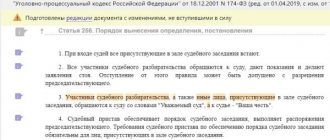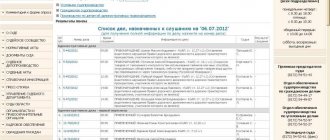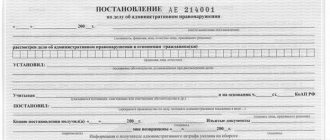How does a court hearing in an administrative case proceed?
When considering an administrative case by a court, as a rule, the judge alone considers the administrative case with the participation of the offender. During the consideration, the court secretary is not present and no minutes of the meeting are kept. Cases are considered in a similar way by other authorized bodies, i.e. the case is reviewed by an official.
Moreover, before the offender enters the judge’s office or courtroom, he is required to sign a subscription to explain his rights to him.
When considering a case, the judge announces who is hearing the case and what case is being heard. The identity of the persons who appeared at the hearing of the case is established, their rights and obligations are explained, and received petitions and challenges are resolved. Next, the judge listens to the offender’s explanations, asks questions if necessary, after which he retires to the deliberation room and issues a judicial act on the case.
Resolution of the Supreme Court of the Russian Federation dated January 28, 2020 N 5-AD20-2
SUPREME COURT OF THE RUSSIAN FEDERATION
RESOLUTION
dated January 28, 2021 N 5-AD20-2
Judge of the Supreme Court of the Russian Federation S.B. Nikiforov, having considered the complaint of defense attorney L.N. Stovbur, acting on the basis of a power of attorney in the interests of S.V. Zverev. on the decision of the magistrate of court district N 417 of the Arbat district of Moscow dated March 7, 2021, the decision of the judge of the Presnensky District Court of Moscow dated April 8, 2021 and the decision of the deputy chairman of the Moscow City Court dated October 17, 2021, which entered into legal force in relation to Zverev Stanislav Viktorovich in the case of an administrative offense provided for in Part 1 of Article 12.8 of the Code of the Russian Federation on Administrative Offences,
installed:
by the decision of the magistrate of the judicial district N 417 of the Arbat district of Moscow dated March 7, 2021 (taking into account the ruling on correcting the clerical error dated March 7, 2021), left unchanged by the decision of the judge of the Presnensky District Court of Moscow dated April 8, 2021 and the decision of the deputy Chairman of the Moscow City Court dated October 17, 2021, Zverev S.V. found guilty of committing an administrative offense under Part 1 of Article 12.8 of the Code of the Russian Federation on Administrative Offences, and was subjected to administrative punishment in the form of an administrative fine in the amount of 30,000 rubles with deprivation of the right to drive vehicles for a period of 1 year 9 months.
In a complaint filed with the Supreme Court of the Russian Federation, defense lawyer L.N. Stovbur requests the cancellation of the verdicts against S.V. Zverev. judicial acts, citing their illegality.
Studying the materials of the case of an administrative offense and the arguments of the complaint allows us to come to the following conclusions.
In accordance with Part 1 of Article 1.6 of the Code of the Russian Federation on Administrative Offenses, a person brought to administrative responsibility cannot be subjected to administrative punishment and measures to ensure proceedings in a case of an administrative offense other than on the grounds and in the manner established by law.
The provisions of the said article of the Code of the Russian Federation on administrative offenses to ensure legality when applying administrative coercive measures presuppose not only the existence of legal grounds for applying an administrative penalty, but also compliance with the procedure established by law for bringing a person to administrative responsibility.
In accordance with Part 1 of Article 28.2 of the Code of Administrative Offenses of the Russian Federation, a protocol is drawn up on the commission of an administrative offense, except for the cases provided for in Article 28.4, Parts 1 and 3 of Article 28.6 of the said Code.
The protocol on an administrative offense shall indicate the date and place of its preparation, the position, surname and initials of the person who compiled the protocol, information about the person against whom the case of an administrative offense was initiated, surnames, first names, patronymics, addresses of the place of residence of witnesses and victims, if any. witnesses and victims, place, time of commission and event of an administrative offense, article of the said Code or law of a constituent entity of the Russian Federation providing for administrative liability for this administrative offense, explanation of the individual or legal representative of the legal entity against whom the case was initiated, other information necessary for resolution of the case (Part 2 of Article 28.2 of the Code of the Russian Federation on Administrative Offenses).
By virtue of Part 4 of Article 28.2 of the Code of Administrative Offenses of the Russian Federation, an individual or a legal representative of a legal entity against whom a case of an administrative offense has been initiated must be given the opportunity to familiarize themselves with the protocol of an administrative offense. These persons have the right to submit explanations and comments on the contents of the protocol, which are attached to the protocol.
According to Part 6 of Article 28.2 of the Code of the Russian Federation on Administrative Offenses, an individual or a legal representative of a legal entity against whom a case of an administrative offense has been initiated, as well as the victim, is given a copy of the protocol on the administrative offense against receipt.
In the event of failure to appear by an individual, or a legal representative of an individual, or a legal representative of a legal entity in respect of whom proceedings for an administrative offense are being conducted, if they are notified in the prescribed manner, a protocol on the administrative offense is drawn up in their absence. A copy of the protocol on an administrative offense is sent to the person in respect of whom it was drawn up within three days from the date of drawing up the said protocol (part 4.1 of Article 28.2 of the Code of the Russian Federation on Administrative Offenses).
The interpretation of the provisions of parts 4, 4.1, 6 of Article 28.2 of the Code of the Russian Federation on Administrative Offenses in their systemic relationship allows us to come to the conclusion that changes previously made to the protocol on an administrative offense, other procedural documents drawn up when initiating a case, information are made in the presence of the person in respect of whom a protocol on an administrative offense has been drawn up. In its absence, such changes can be made to procedural acts only if there is information about proper notification of such a person.
A different interpretation of the above norms of the Code of the Russian Federation on Administrative Offenses would mean a violation of the rights of the person against whom proceedings are being conducted for an administrative offense.
Thus, the above norms provide a person brought to administrative responsibility with a legal opportunity to protect rights and legitimate interests and his direct participation in drawing up a protocol on removal from driving a vehicle, a protocol on a case of an administrative offense, other procedural documents, and making changes in such procedural acts. In connection with the above, the administrative body does not have the right to unilaterally draw up or make changes to these protocols.
During the proceedings, as well as in this complaint, defense counsel Stovbur L.N. consistently stated that the protocol on an administrative offense and the certificate of examination for alcohol intoxication after their preparation were amended without the participation of the person brought to administrative responsibility.
From the materials of the case of an administrative offense, it is seen that on February 10, 2021, the inspector of the traffic police 4 BP traffic police department of the traffic police department of internal affairs for the Central Administrative District of the Main Directorate of the Ministry of Internal Affairs of Russia in Moscow in relation to Zverev S.V. a protocol was drawn up on an administrative offense under Part 1 of Article 12.8 of the Code of the Russian Federation on Administrative Offences, according to which on February 09, 2019 at 23:00 on Trubnikovsky Lane, 15 p. 1 in Moscow, in violation of paragraph 2.7 of the Traffic Rules drove an Infinity QX56 vehicle, state registration plate <...>, while intoxicated.
Meanwhile, the protocol on administrative offense 77 MR N 1311477 presented in the case materials contains corrections in the date and time of the administrative offense (case file 1).
In addition, the certificate of examination for alcohol intoxication 77 MA N 0188524 also contains corrections in the date of its preparation (case sheet 3).
To eliminate these contradictions, the magistrate interrogated the inspector of the 4th BP Traffic Police Department of the Internal Affairs Directorate for the Central Administrative District of the Main Directorate of the Ministry of Internal Affairs of Russia for Moscow N.A. Rusinov, who gave explanations regarding the changes made.
At the same time, witness T. was not called or interrogated by the magistrate at the court hearing.
The summoning of the second witness E. by the ruling of the magistrate of judicial district No. 417 of the Arbat district of Moscow dated February 21, 2019, was refused. Motivating the refusal to satisfy the petition, the magistrate concluded that the petition was filed prematurely and the circumstances of the traffic accident were not relevant to the merits of the case under consideration.
The reasons why Efanova O.K. was not interrogated as a witness in a case of an administrative offense by a magistrate, and was not indicated in the decision on the imposition of an administrative penalty.
Thus, the issue of amending the protocol on administrative offense 77 MR N 1311477 and the certificate of examination for alcohol intoxication 77 MA N 0188524 in the presence of witnesses T. and E. was not clarified by the magistrate.
According to the position of the European Court of Human Rights, before a person is found guilty, all evidence must be examined by the court in his presence during a public hearing in order to ensure an adversarial process, the right to defense requires that the accused be given an adequate and proper opportunity to challenge the testimony of a witness and produce it interrogation Otherwise, it is recognized as a violation of the right to a fair trial (Resolution of the European Court of Human Rights of March 13, 2012 “Case of Karpenko v. Russian Federation”, Resolution of the European Court of Human Rights of May 3, 2012 “Case of Salikhov) v. Russian Federation”, Resolution of the European Court of Human Rights of April 25, 2013 “Case of Yevgeniy Ivanov v. Russian Federation”).
Stated by the defender Stovbur L.N. the argument to amend the aforementioned protocol on an administrative offense and the certificate of examination for alcohol intoxication at the stage of consideration of this complaint against the decision that has entered into legal force in the case of an administrative offense cannot be verified.
In addition, within the meaning of Part 3 of Article 28.2 of the Code of the Russian Federation on Administrative Offenses, when drawing up a protocol on an administrative offense, an individual or a legal representative of a legal entity against whom a case of an administrative offense has been initiated, their rights and obligations provided for by the Code of the Russian Federation on Administrative Offenses are explained. offenses, which are recorded in the protocol.
In accordance with paragraph 18 of the Resolution of the Plenum of the Supreme Court of the Russian Federation dated March 24, 2005 N “On some issues that arise for courts when applying the Code of the Russian Federation on Administrative Offences”, when considering a case of an administrative offense, the evidence collected in the case must be assessed in accordance with Article 26.11 of the Code of the Russian Federation on Administrative Offenses, as well as from the point of view of compliance with the requirements of the law when receiving them (Part 3 of Article 26.2 of the Code of the Russian Federation on Administrative Offenses).
A violation entailing the impossibility of using evidence may be recognized, in particular, by obtaining explanations from a victim, a witness, a person against whom proceedings are being conducted for an administrative offense, who were not previously explained their rights and obligations, provided for in Part 1 of Article 25.1, Part 2 of Article 25.2, Part 3 of Article 25.6 of the Code of the Russian Federation on Administrative Offences.
From the contents of the protocol on administrative offense 77 MR N 1311477 it is seen that Zverev S.V. in violation of the requirements of the current legislation, the provisions of Article 25.1 of the Code of the Russian Federation on Administrative Offenses were not clarified.
In the corresponding column about familiarization with the provisions of these articles, the signature of S.V. Zverev. missing (case file 1). A receipt for clarification of rights to a person against whom proceedings are being conducted for an administrative offense when drawing up procedural documents in this case is also absent from the case materials.
The foregoing indicates that Zverev S.V. was not aware of the scope of procedural rights granted to him, which resulted in a violation of his right to defense.
In accordance with Article 26.2 of the Code of the Russian Federation on Administrative Offenses, evidence in a case of an administrative offense is any factual data on the basis of which the judge, body, official in charge of the case establishes the presence or absence of an administrative offense event, the guilt of the person involved to administrative liability, as well as other circumstances relevant for the correct resolution of the case (Part 1).
These data are established by the protocol on an administrative offense, other protocols provided for by this Code, explanations of the person against whom proceedings are being conducted for an administrative offense, testimony of the victim, witnesses, expert opinions, other documents, as well as testimony of special technical means, material evidence ( part 2).
It is not allowed to use evidence in a case of an administrative offense, including the results of an inspection carried out during the implementation of state control (supervision) and municipal control, if the specified evidence was obtained in violation of the law (Part 3).
Under such circumstances, the record of an administrative offense is inadmissible evidence and could not be used by the court when making a decision.
These violations of the requirements of the Code of the Russian Federation on Administrative Offenses are significant. Taking into account the provisions of paragraph 4 of part 1 of Article 29.4 of the Code of the Russian Federation on Administrative Offenses, these violations cannot be compensated when considering a complaint against a decision that has entered into legal force in a case of an administrative offense.
A similar legal position on the materiality and irreparability of violations of the requirements of the Code of the Russian Federation on Administrative Offenses when rights are not explained to participants in proceedings in an administrative offense case has previously been repeatedly expressed by the Moscow City Court in a number of decisions taken in cases.
The presented evidence and arguments were not given a proper assessment by the courts. Consequently, when considering this case of an administrative offense, the requirements of Articles 24.1 and 26.1 of the Code of the Russian Federation on Administrative Offenses regarding the clarification of all circumstances relevant to the correct resolution of the case were not met.
By virtue of the provisions of parts 1 and 4 of Article 1.5 of the Code of the Russian Federation on Administrative Offenses, a person is subject to administrative liability only for those administrative offenses in respect of which his guilt has been established. Irremovable doubts about the guilt of a person brought to administrative responsibility are interpreted in favor of this person.
In accordance with paragraph 4 of part 2 of Article 30.17 of the Code of the Russian Federation on Administrative Offenses, based on the results of consideration of a complaint, protest against a decision in a case of an administrative offense that has entered into legal force, decisions based on the results of consideration of complaints, protests, a decision is made to cancel the decision in a case of an administrative offense , decisions based on the results of consideration of a complaint, protest and on termination of proceedings in the case in the presence of at least one of the circumstances provided for in Articles 2.9, 24.5 of this Code, as well as in the absence of proof of the circumstances on the basis of which the specified resolution or decision was made.
Under such circumstances, the decision of the magistrate of the judicial district N 417 of the Arbat district of Moscow dated March 7, 2021, the decision of the judge of the Presnensky District Court of Moscow dated April 8, 2021 and the decision of the deputy chairman of the Moscow City Court dated October 17, 2021, issued in relation to Zverev Stanislav Viktorovich in the case of an administrative offense provided for in Part 1 of Article 12.8 of the Code of the Russian Federation on Administrative Offenses are subject to cancellation.
Proceedings in the case of an administrative offense provided for in Part 1 of Article 12.8 of the Code of the Russian Federation on Administrative Offenses in relation to Zverev Stanislav Viktorovich are subject to termination on the basis of paragraph 4 of Part 2 of Article 30.17 of the said Code - due to the lack of proof of the circumstances on the basis of which the decisions were made court rulings in the case.
Based on the above, guided by Articles 30.13 and 30.17 of the Code of the Russian Federation on Administrative Offences, the judge of the Supreme Court of the Russian Federation
decided:
complaint from defense attorney L.N. Stovbur to satisfy.
Resolution of the magistrate of the judicial district N 417 of the Arbat district of Moscow dated March 7, 2021, the decision of the judge of the Presnensky District Court of Moscow dated April 8, 2021 and the resolution of the deputy chairman of the Moscow City Court dated October 17, 2019, issued in relation to Zverev Stanislav Viktorovich in the case of an administrative offense provided for in Part 1 of Article 12.8 of the Code of the Russian Federation on Administrative Offences, cancel.
The proceedings in the case of an administrative offense are terminated on the basis of paragraph 4 of part 2 of Article 30.17 of the Code of the Russian Federation on Administrative Offenses.
Supreme Court Judge
Russian Federation
S.B.NIKIFOROV
Mobile court hearing in an administrative case
The Code of Administrative Offenses of the Russian Federation does not contain rules that would regulate the procedure for holding a mobile court hearing.
However, there are judicial acts in administrative cases, which indicate that an on-site court hearing was held due to the fact that the offender, for example, was undergoing treatment and could not appear in court.
Thus, if the judge considers it necessary to hold an on-site hearing, then such a meeting can be held.
At the same time, on-site hearings are not often practiced not only in administrative cases, but even in civil and criminal ones. This is the exception rather than the rule.
Are minutes of the court hearing in an administrative case kept?
Most often, minutes of the court hearing in an administrative case are not kept. According to the provisions of Art. 29.8 of the Code of Administrative Offenses of the Russian Federation, a protocol on the consideration of the case is drawn up when the case is considered by a collegial body.
At the same time, the Code of Administrative Offenses of the Russian Federation does not prohibit the keeping of a protocol when a case is considered by a single judge. Thus, if necessary, minutes of the court hearing can be kept when considering an administrative case.
In addition, the person held accountable may request that a record of the court session be kept. In this case, the judge, when resolving such a petition, decides whether to satisfy it or refuse to satisfy it. If the petition is granted, then the minutes of the court hearing will be kept by the secretary.
Which court considers administrative offenses
Cases of administrative offenses are heard by magistrates' courts . The exceptions are administrative cases of the following nature:
- Courts of general jurisdiction hear cases if one of the parties is an individual.
- The district court considers the case if it is subject to an administrative investigation or if the punishment includes suspension of activities, dismissal or deportation abroad.
- The district court also deals with cases of violation of laws on meetings and rallies, cultural and historical values, and disobedience to civil service employees.
How long does a court hearing in an administrative case last?
It is impossible to answer the question of how long a court hearing in an administrative case lasts, since the hearing can last 5 minutes, or maybe several hours.
The duration of consideration of an administrative case depends on the composition of the offense, on whether the person admits his guilt or not, on the person’s explanations on the issue of bringing him to justice, on the amount of evidence in the case, on the petitions filed, etc. Also, the duration of the court session will be influenced by the time the judge spends in the deliberation room.
For example, when justices of the peace consider similar administrative cases, then they already have a developed practice in making decisions on such cases and judicial acts are issued of the same type, only the full name of the offender changes, so the consideration of the case takes place within 5 minutes. If a case has been submitted for consideration on some offense that is new to the judge, then it will take a little more time, since it will be necessary not only to understand the case, but also to print a judicial act, so to speak, not in a standard form.
How to reschedule a court hearing in an administrative case?
The postponement of the court hearing is associated with the postponement of the consideration of the case.
The basis for postponing the consideration of the case may be the person’s failure to appear at the hearing, the person’s petition to postpone the case, and other reasons that the judge considers valid for postponing the case.
If the offender is unable to appear at the trial, he must send a written request to the court to postpone the consideration of the case, indicating good reasons why he asks to postpone the hearing.
The judge, having received a petition for adjournment, is obliged to consider it and make a decision either to refuse to satisfy the petition or to postpone the court hearing.
Deadlines and decisions in administrative proceedings
If documents are correctly prepared and an administrative claim is filed by the plaintiff, the court is obliged to make one of the following procedural decisions:
- On accepting a claim for production and preparing the case for trial. Such a decision is made by the judge within 3 days from the date of receipt of the claim; copies of the claim and the necessary attachments are sent to the defendant for review.
- Refusal to accept the claim. Such a decision is made in the form of a reasoned determination, on the basis of the norms established by Article 128 of the CAS of the Russian Federation. The determination can be appealed privately; repeated filing of an administrative claim is not allowed.
- On leaving the statement of claim without progress due to the need to correct deficiencies, in particular concerns the documents attached to the claim and the determination of legal costs. It is very important to comply with the deadlines set by the judge for correcting deficiencies, otherwise the claim will be returned to the applicant and will be considered not filed. After the errors are corrected, the application is accepted for processing and the time frame for consideration of the case begins to run from the moment the claim was initially filed.
- On returning the claim to the applicant. As a rule, such a decision is made in case of non-compliance with the pre-trial procedure for resolving a dispute, in case of violation of the rules of jurisdiction, etc.
The period for consideration of an administrative case should not exceed 2 months from the date of receipt of the statement of claim in court. If the case is considered by the Supreme Court, the period of consideration should not exceed 3 months. These deadlines can be extended by no more than one month by the chairman of the court, while the plaintiff cannot exercise the right to file an application to expedite the consideration of the case in the trial.






